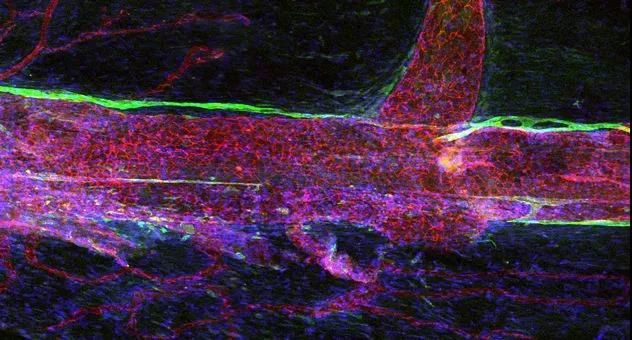Research reveals new features of meningeal lymphatics

Research reveals new features of meningeal lymphatics

Copyright © iCell Bioscience Inc, Shanghai 2018-2019
Alzheimer's disease is an important killer threatening the health of middle-aged people, but its treatment is quite limited, in part because scientists lack a deep understanding of the disease. As you age, the fluid in your brain will slow down, sometimes even as slowly as half as young as you are.
The team of neuroscientists at the University of Virginia, Jonathan Kipnis, discovered that the brain was surrounded by lymphatics, subverting the old concept of "the brain has no lymphatics" in textbooks for decades. After a lapse of three years, the Jonathan Kipnis team once again confirmed that these lymphatic vessels were associated with Alzheimer's disease and found potential countermeasures.

These lymphatic vessels, called "meningeal lymphatic vessels", are a network of large molecules that drain inside the central nervous system and are linked to the peripheral immune system and play an important role in maintaining healthy brain homeostasis.
The study found that these lymphatic vessels are responsible for draining macromolecules from the cerebrospinal fluid and interstitial fluids of the central nervous system to the cervical lymph nodes, effectively removing brain "garbage" (such as protein lesions and cell debris typical of Alzheimer's disease). Once this transportation system is blocked, it will aggravate the decline of cognitive function and easily lead to a series of brain diseases related to aging.
The team used healthy old mice as a model to treat them with molecules that stimulated the size and circulation of the meninges. It was found that the learning and memory abilities of these mice were significantly enhanced.
The researchers found that proteins and cell debris associated with Alzheimer's disease are excreted through the lymphatics, so once the circulation is blocked, the accumulation of protein is exacerbated.
Research experts designed a hydrogel containing vascular endothelial growth factor C (VEGF-C). This gel will spread VEGF-C through the skull to the meningeal lymphatic vessels, causing them to swell. The use of nuclear magnetic resonance techniques has shown that this strategy can indeed increase the fluid flow of lymphatic vessels. Moreover, this strategy works best for healthy mice with cognitive decline (related to natural aging) (memory, learning).
Hydrogels are widely used in tissue engineering, wound healing, and stem cell research and are used to transport proteins or molecules to specific locations in the body. The research team hopes that in future research, they can confirm that similar hydrogels can be used as a non-invasive method to improve brain function.
 Loading ....
Loading ....
